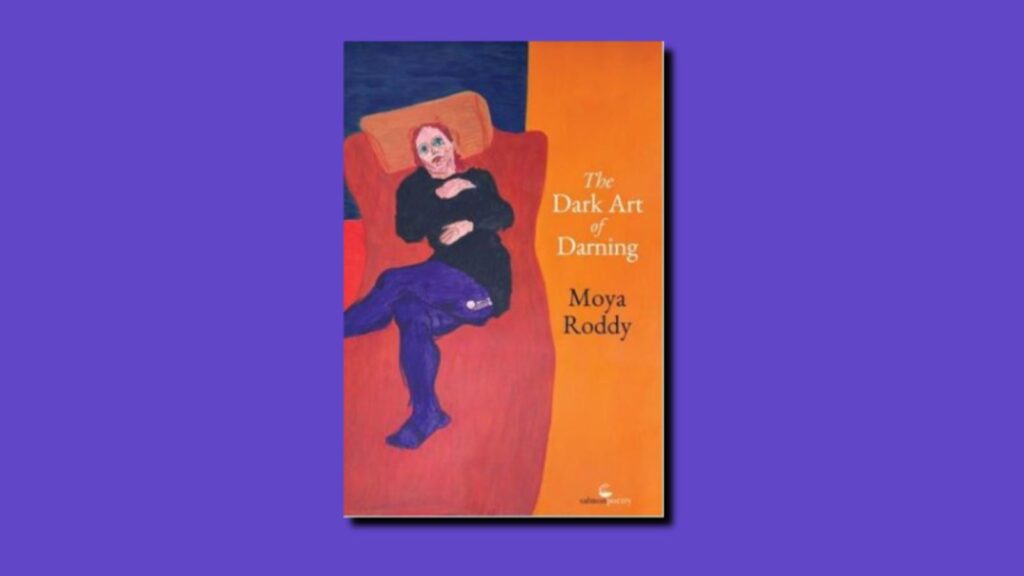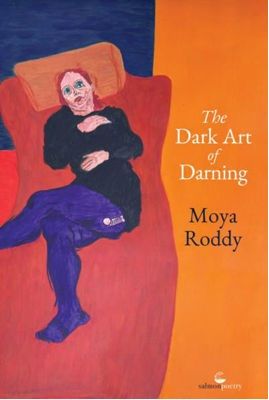
The Dark Art of Darning|Moya Roddy|Salmon
Into the Tangled Past—The Dark Art of Darning, by Moya Roddy
by Neil McCarthy
The past is never dead. It’s not even past. So said William Faulkner, and a dozen or so folk after him, paraphrasing as they pleased. But in truth, Faulkner hit the nail on the head. And while many of us do our utmost to sweep the past under the rug, look away when confronted, even pretend it never happened—anything to avoid puncturing the present—a few choose to meet the past head on, give it the benefit of hindsight, the wisdom of years.
Moya Roddy is one of those few. To say she is haunted by nostalgia would be wide of the mark. It would, perhaps, be more accurate to say she owns it. Her latest collection of poetry picks up from where Out of the Ordinary (Salmon Poetry, 2018) left off—a narrator in a cyclone of ghosts. And while the casual reader might be guilty of assuming The Dark Art of Darning is a sequel, it’s anything but.
To say she is haunted by nostalgia would be wide of the mark. It would, perhaps, be more accurate to say she owns it
I make the latter assumption for the reason that Roddy’s first collection directly addressed her mother, whereas this latest offering opens with a series of poems about the writer’s father. The titular poem, and first poem in the book, wastes no time in setting the tone for things to come—that the father figure was one that was always just out of reach while she was on his heels:
I got all the practice I needed
on my father’s heels; he usually
waited until nothing was left
but a gaping hole
My Father’s Daughter further illustrates the distance she was trying to bridge by not backing down to offerings she would have preferred to decline:
[…] never refusing
the brandy or cigars although both
made me sick: for better or worse
I was my father’s daughter.
The appearance of her father in the first eight poems almost serves as a vessel to revisit matters unfinished, or themes not fully dealt with. Across two collections, the geography of loss is eloquently penned so as to invite the reader to relate, and we do. Here, we have fiercely personal accounts of a family life that any of us could have had growing up: the stoic father figure always one step outside of the frame; a mother who is always young in our memories […] flirting as she peeps from behind /a painted fan, her free hand reaching / towards the future” (Geisha).
But then, there is also a frustration of not knowing, of accepting photographs and memories for what they are. Memoriam Card is to the collection as a click of the fingers is to a trance:
Were you welcoming
death or was it one last embrace of all
you saw? There are things I’ll never
know; the photo’s cropped to size.
This collection, though, is much deeper than it is on the surface. Again, I say this not as a caveat but more out of encouragement to read closely. It’s all too easy to pick up a poetry book and randomly read a scatter of poems in no order whatsoever just so we can say yeah, I read it. And in doing so, you risk missing out on the effort a poet like Moya Roddy has put into the chronology of her work.
there is more to this delving into the past than direct addresses to her parents
Poems that began with her father have brought us back to her mother, and as soon as that base is established, we begin to realise there is more to this delving into the past than direct addresses to her parents. If the poet’s past is a jigsaw of memories and raw emotions that poetry allows her to revisit, then Changeling is a poem which sees the pieces come together to fill in a large part of the puzzle.
There is now a shift from parents to sibling, and this poem adds another dimension to the collection. Pulling a few lines from that poem and the few that follow would serve no reward in this review because, unlike earlier poems in the collection that play with simile and metaphor, these poems to her brother are simple, plain, and honest. You just have to read them.
Shifting Sands, for me, is the poem that signals the switch from darning to embroidery
Shifting Sands, for me, is the poem that signals the switch from darning to embroidery. It’s simply beautiful, and we are now learning about the poet not just as a daughter, or a sister, but also as a mother with the same familiar helplessness as those around her move at speeds and in directions that she can’t quite grasp:
The triumphant grin you gave when I reached
the water’s edge before vanishing like a fish,
leaving me to flounder, nothing
but sand beneath my feet.
The sentiment is echoed in Mother and Daughter where the poet’s dilemma of trying to please her father, her mother, and now her daughter come to light; that offering her daughter the garden that bad health deprived her own mother might keep her close:
I offered a summer’s garden,
a landscape of golden wheat—
but she demanded pomegranates
although they were out of season.
A reader will always have different levels of investment in a book, will always be drawn towards a relatable emotion, a few lines here and there which evoke memories of their own, beginning a foray into a tangled past. I know that I fell headfirst into this collection, perhaps with these lines giving you the impression that this is only a visceral, haunting collection, snapshots of loss and frustration: it’s not.
There are poems in here which are playful, uplifting, romantic. I get the feeling that poetry of this nature is not catharsis for Roddy but more like wisdom for the offering:
Holding the wrinkled
wool tight, I re-knit, repeat the same
pattern, aware of an absence — a presence
(Dropped Stitches)
There is a sense of calm in this book and a feeling that with each patient loop, those holes in Roddy’s past are heedfully being darned into some sort of closure.












